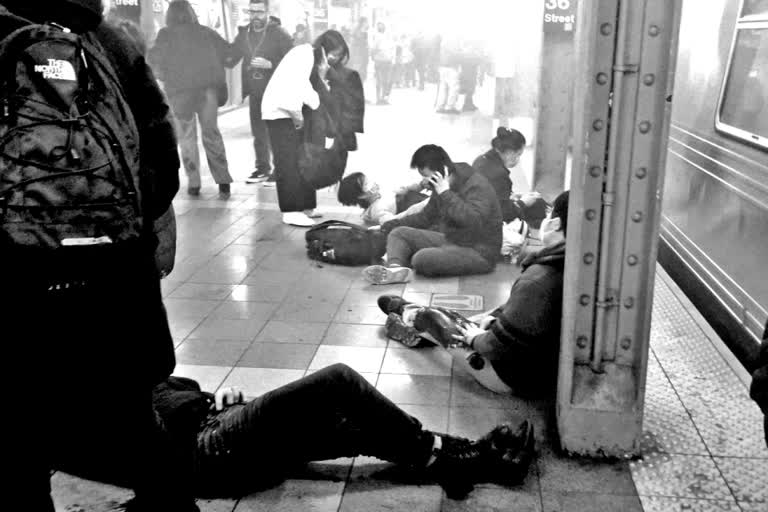Hyderabad: After a career-high in India's national capital, Delhi, Arushi Sharma decided to move to the United States to complete her Master's degree. Advanced occupational prospects made her take the quantum leap. New York, in many ways, felt dynamic, pulsating with life -- a city she happily calls her second home, a city she felt safe living in, but not anymore.
On April 12, an attack on a crowded train that was travelling towards the 36th Street station in Brooklyn's Sunset Park neighbourhood left at least 29 people injured. A handgun was viciously fired 33 times in a packed train while smoke grenades were set off to terrorise the daily commuters of New York.
Arushi, 29, a first-year Mass Communication student at the New York University (NYU), who takes the subway every day to commute has been left with a deep sense of unease. So much so that she refrained from taking the subway on the next day of the attack, switching to an unaffordable Uber ride with her friends chipping in, and divvying up the fare.
"After this incident, there is an even higher degree of anxiety related to my commute since the subway is the primary mode of transportation for most people in New York, other modes are comparatively expensive, especially for a student like me," she tells ETV Bharat from Brooklyn. While the city riders also take buses, cabs, and carpools to work, the subway -- referred to as 'trains' by the locals -- is the primary public transportation system in New York City with 39 per cent of the population using it. Back home, Arushi had been travelling on the Delhi Metro, a public transport she now finds more reassuring than the New York subway. She, however, concedes that the police's response in the latter is much faster.
The accused Frank James, 62 was arrested by the New York City police, acting on a tip-off, 30 hours after the suspect remained at large -- enough time to make the New Yorkers grow more anxious. Mayor Eric Adams made the announcement via video news conference: "My fellow New Yorkers: we got him." But was it enough to allay the fears of the citizens?
At the outset, the thought of a terrorist attack struck, but the police refrained from treating it as one. "Is it safe to ride the train? How will I get home today?" was the initial concern of Jake Rubenstein, a software engineer with Google in Manhattan. As the day wore on he had to figure out a way to travel home.
Jake is a resident of Brooklyn at Crown Heights, 2.5 miles from where the attack took place, and mostly relies on the subway for transit. He takes the train from Prospect Park to get to work and meet his friends in Manhattan. "Unfortunately, it seems as if there is news of another subway attack every other week, which can sometimes desensitize you to the risk incurred every day when you ride the train. The sheer scale of this issue sets it apart, not to mention the close proximity to where my friends and I live," he says.
While he talks about the need to begin divesting from the New York Police Department (NYPD) and investing in alternative community-based approaches for crime reduction and prevention, he still believes that the city is safer compared to the rest of the places in the United States. Arianne, a native New Yorker, is "looking around at all times" as a safety precaution. Would it be the same while commuting through the subway after the attack? "No, not at all, I'm extremely on edge and hyper-aware of my surroundings," she says.
Arianne believes the country needs to explicate mental health issues to fend off such incidents in the future, holding accountable the dispiritedness of the establishment in addressing the issue. She believes that the pandemic may have accentuated such behaviour of which the attack on the subway was a fallout.
"It's mental health. This country has a mental health epidemic, and I think it has for a very long time. I just think the pandemic made it more salient," she explains. Even as normalcy returned with people going about their usual rigmarole, Arianne believes New York is still safer than many places. But lately, she says, she "feels different" in a city she has lived in all her life.
Also read: Brooklyn subway suspect tipped off police to his location



